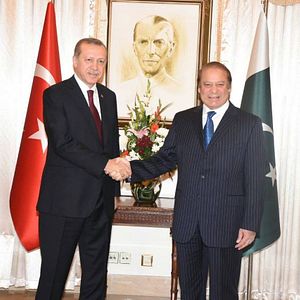Turkish President Recep Tayyip Erdogan’s two-day visit to Pakistan last week, where he held multiple meetings with Pakistan Prime Minister Nawaz Sharif, was arguably more significant for the two leaders than the two states. Both Sharif and Erdogan had already underscored the importance of the trip in the build up to the trip, where the two leaders reiterated vows and reaffirmed agreements on bilateral trade and defense.
Erdogan addressed the Pakistani Parliament on November 17, in a joint session which the opposition Pakistan Tehrik-e-Insaf (PTI) boycotted despite government pressure to express national unity. The PTI had announced a boycott of the Parliament on October 4, citing Nawaz Sharif’s “ineligibility to lead the country” following the Panama Papers revelations.
Inviting Erdogan to address the Parliament allowed Sharif to exert pressure on the PTI by flexing his diplomatic muscles. That invitation was coupled with the formal inauguration of the China-Pakistan Economic Corridor (CPEC) on November 13, with both the Chinese ambassador and Army Chief Raheel Sharif standing next to Nawaz Sharif.
For the Sharif family, currently on trial in the Supreme Court over the Panama Leaks, touting high-profile diplomatic relations, and economic progress, helps keep the national sentiment in check, and ensures that the PTI leadership remains on the back foot.
The Qatari prince Sheikh Hamad bin Jassim bin Jaber Al-Thani’s letter presented to the Supreme Court, claiming that the Sharifs’ London apartments were a gift from the royal family, also showcases how Sharif relies on personal relationships with global leaders to bail him out of the accountability quagmire back home. The Qatari prince has since been issued a permit for hunting the endangered bird houbara bustard.
While Sharif remains paranoid about potentially having to step down following the trial, Erdogan is obsessing over Fethullah Gulen, who the Turkish president claims was behind July’s coup attempt to remove him from office. In a press conference before the Parliament address in Islamabad, Erdogan bellowed that the “Fethullah Terror Organization (Feto) is a threat to Pakistan’s security.”
Even before Erdogan landed in Pakistan, he had asked the Pakistani government to remove the Turkish staff from the Pak-Turk school chain across the country, claiming the teachers were linked to Gulen’s Hizmet network. When Nawaz appeased Erdogan by ordering the Turkish teachers to leave, Erdogan returned the favor by echoing Pakistan’s stance on Kashmir.
With a trip to Uzbekistan immediately following the visit to Pakistan, expressing support for “our [Muslim] brothers and sisters in Kashmir” would earn Erdogan brownie points in the Muslim world at a time when he’s campaigning against Gulen and his Hizmet network.
Erdogan’s fixation with Gulen stems from the Turkish president looking to overcome any hurdles en route to a constitutional amendment that could keep him in office till 2029. The ruling AK Party is hoping for a referendum as Erdogan continues a domestic and international clampdown, with his paranoia soaring after this year’s botched coup attempt.
As Turkey’s chances of joining the European Union become increasingly gloomy, Erdogan is eyeing more influence in the Muslim world, which overlaps seamlessly with his planned Islamization of the country. The Turkish government might have withdrawn a controversial bill that pardons rapists if they married their victims, following street protests, but once the proposed referendum is successful and Constitution amended, an increasingly authoritative Erdogan wouldn’t have to pay heed to public opinion.
For Sharif, Erdogan’s support on the Kashmir front keeps the powerful military establishment satisfied as Pakistan’s prime minister approaches his first-ever completion of a full term. Meanwhile, Army Chief General Raheel Sharif (no relation to the prime minister) initiated a farewell tour following Erdogan’s visit, as he looks to become the first Pakistan army chief in two decades to step down on time at the end of this month.
The year 2017 will be crucial for both Sharif and Erdogan, and they will both be looking to each other for diplomatic support. With the ruling Pakistan Muslim League-Nawaz (PML-N) looking stronger in Punjab, following local elections and high-profile by-elections, the PTI might look for one final push to prevent Sharif from remaining prime minister going to the 2018 elections.
Meanwhile, Erdogan is hoping to hold the Constitution-reshaping referendum next spring, which would give him unprecedented control over society – allowing him to have authority over naming university heads across Turkey, for example. Erdogan’s clampdown against Islamic pluralism through his own brand of Islam, epitomized by his targeting of the Gulen Movement, would be further bolstered through stronger ties with other Sunni Muslim states.
Coincidentally, both Turkey and Pakistan are witnessing the growing presence of Islamic State (ISIS) orchestrated terror attacks, and the rising menace of a volatile neighborhood. And both the Erdogan and Sharif governments seem to be targeting separatist movements (involving Kurds and Balochs, respectively) in the garb of fighting jihadist terror. Duplicity in dealing with militancy and appeasement of radical Islamists could further bring Erdogan and Sharif together.

































